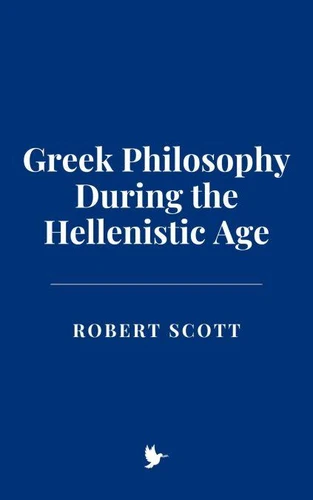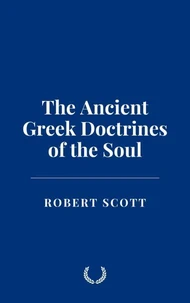Greek Philosophy During the Hellenistic Age
Par :Formats :
Disponible dans votre compte client Decitre ou Furet du Nord dès validation de votre commande. Le format ePub est :
- Compatible avec une lecture sur My Vivlio (smartphone, tablette, ordinateur)
- Compatible avec une lecture sur liseuses Vivlio
- Pour les liseuses autres que Vivlio, vous devez utiliser le logiciel Adobe Digital Edition. Non compatible avec la lecture sur les liseuses Kindle, Remarkable et Sony
 , qui est-ce ?
, qui est-ce ?Notre partenaire de plateforme de lecture numérique où vous retrouverez l'ensemble de vos ebooks gratuitement
Pour en savoir plus sur nos ebooks, consultez notre aide en ligne ici
- FormatePub
- ISBN8227223517
- EAN9798227223517
- Date de parution08/02/2025
- Protection num.pas de protection
- Infos supplémentairesepub
- ÉditeurBig Dog Books, LLC
Résumé
The Hellenistic Age, spanning roughly from the death of Alexander the Great in 323 BCE to the rise of Roman imperial dominance around 31 BCE, marks a crucial period in the history of philosophy. This era, one of cultural and intellectual flourishing, was born out of the vast and dramatic changes brought about by Alexander's conquests. His military campaigns extended Greek influence across Asia and Egypt, effectively transforming the Mediterranean world and initiating an era in which Greek culture, philosophy, and ideas permeated far beyond the Greek city-states.
It was a time of political fragmentation, as the once unified Greek city-state system, epitomized by Athens, gave way to the formation of vast empires under the rule of Alexander's successors, the Diadochi. These empires, such as the Seleucid and Ptolemaic kingdoms, created an entirely new intellectual and political context in which philosophy could evolve. The philosophical scene during this time, often referred to as the Hellenistic philosophical schools, was characterized by a shift from the political engagement of earlier thinkers, such as Plato and Aristotle, to a more individualistic and ethical focus.
Philosophers of the Hellenistic period sought to answer fundamental questions about how to live a good life in an increasingly uncertain and tumultuous world. With the collapse of the Athenian democracy and the rise of powerful monarchies, many thinkers turned away from the traditional civic ideals of Greek philosophy and instead explored the nature of personal happiness, virtue, and the relationship between the individual and society.
In doing so, they helped to shape the moral, metaphysical, and logical foundations of Western philosophy.
It was a time of political fragmentation, as the once unified Greek city-state system, epitomized by Athens, gave way to the formation of vast empires under the rule of Alexander's successors, the Diadochi. These empires, such as the Seleucid and Ptolemaic kingdoms, created an entirely new intellectual and political context in which philosophy could evolve. The philosophical scene during this time, often referred to as the Hellenistic philosophical schools, was characterized by a shift from the political engagement of earlier thinkers, such as Plato and Aristotle, to a more individualistic and ethical focus.
Philosophers of the Hellenistic period sought to answer fundamental questions about how to live a good life in an increasingly uncertain and tumultuous world. With the collapse of the Athenian democracy and the rise of powerful monarchies, many thinkers turned away from the traditional civic ideals of Greek philosophy and instead explored the nature of personal happiness, virtue, and the relationship between the individual and society.
In doing so, they helped to shape the moral, metaphysical, and logical foundations of Western philosophy.
The Hellenistic Age, spanning roughly from the death of Alexander the Great in 323 BCE to the rise of Roman imperial dominance around 31 BCE, marks a crucial period in the history of philosophy. This era, one of cultural and intellectual flourishing, was born out of the vast and dramatic changes brought about by Alexander's conquests. His military campaigns extended Greek influence across Asia and Egypt, effectively transforming the Mediterranean world and initiating an era in which Greek culture, philosophy, and ideas permeated far beyond the Greek city-states.
It was a time of political fragmentation, as the once unified Greek city-state system, epitomized by Athens, gave way to the formation of vast empires under the rule of Alexander's successors, the Diadochi. These empires, such as the Seleucid and Ptolemaic kingdoms, created an entirely new intellectual and political context in which philosophy could evolve. The philosophical scene during this time, often referred to as the Hellenistic philosophical schools, was characterized by a shift from the political engagement of earlier thinkers, such as Plato and Aristotle, to a more individualistic and ethical focus.
Philosophers of the Hellenistic period sought to answer fundamental questions about how to live a good life in an increasingly uncertain and tumultuous world. With the collapse of the Athenian democracy and the rise of powerful monarchies, many thinkers turned away from the traditional civic ideals of Greek philosophy and instead explored the nature of personal happiness, virtue, and the relationship between the individual and society.
In doing so, they helped to shape the moral, metaphysical, and logical foundations of Western philosophy.
It was a time of political fragmentation, as the once unified Greek city-state system, epitomized by Athens, gave way to the formation of vast empires under the rule of Alexander's successors, the Diadochi. These empires, such as the Seleucid and Ptolemaic kingdoms, created an entirely new intellectual and political context in which philosophy could evolve. The philosophical scene during this time, often referred to as the Hellenistic philosophical schools, was characterized by a shift from the political engagement of earlier thinkers, such as Plato and Aristotle, to a more individualistic and ethical focus.
Philosophers of the Hellenistic period sought to answer fundamental questions about how to live a good life in an increasingly uncertain and tumultuous world. With the collapse of the Athenian democracy and the rise of powerful monarchies, many thinkers turned away from the traditional civic ideals of Greek philosophy and instead explored the nature of personal happiness, virtue, and the relationship between the individual and society.
In doing so, they helped to shape the moral, metaphysical, and logical foundations of Western philosophy.






















